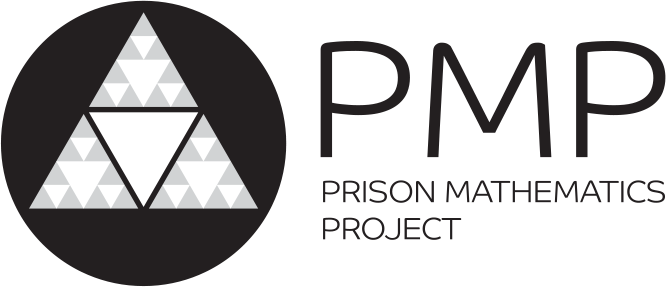Our Purpose
We connect prisoners who are dedicated to change with mentors who support and encourage their interest in mathematics and help to provide the necessary communal framework for rebuilding their lives both during and after their incarceration.
Our Vision
We see a world where desistance can be achieved through a community-based system of restorative justice, supporting cognitive changes and the restructuring of participant’s lives occurring as a result of mentor/participant dynamics.
Our Mission
We support the study of mathematics and its contribution to healthy self-identity and desistance from crime among our participants. We do this by providing mentorship that delivers support and knowledge, instills the idea of community and culture, and establishes network connections enabling participants to self-rehabilitate through their engagement with mathematics.
We nurture this engagement through active mentorship by members of the mathematical community, which continues after our participants are released and can lead to research and publication opportunities. Relationships with mentors ensure an easier transition back into the community for our participants who continue living their mathematical lifestyle.
Where the PMP is Located
As a team we have volunteers located all around the world. Our programs are currently running in the United States, however, we are hoping to expand!

Frequently Asked Questions (FAQ)
Once a mentor or participant signs up we ask them several questions to figure out their mathematical level and what they are hoping to get out of the program. Then we pair people according to interest and level as best we can.
Almost all communication is written. Depending on what the participant has access to, this can either be through physical letters in the mail or e-messaging through prison apps. Typically, all correspondence goes through us to ensure the privacy of our mentors. We print and email your letters to your mentee or send via e-messaging depending on access and the contents of the letters. Your participant’s response goes to our virtual mailbox, where we scan it and send it to you as a PDF. If you would like to, you can set up an e-messaging account to message your mentee directly.
Many of our mentors prefer to work through the PMP interface, while others register for e-messaging so they can communicate directly with their mentee. The option you choose is your personal choice.
Traditionally we have done a Pi Day event on March 14th. In 2024 we held events in Washing, Michigan, and North Dakota. We are hoping to expand our in person offerings, so if you are interested in teaching math in person in prison just let us know.
The biggest requirement is an interest in improving the lives of incarcerated people. The amount of math you know isn't the most important quality in a good mentor. Many of our participants are working towards their GED. As long as you are passionate about making a difference, then you can be a mentor!
The only real requirement we have is that you (or your loved one) is in a state or federal prison. Due to the nature of our program it is very difficult to work with people in local jails.
Unfortunately we cannot offer any college credit at this time. If you (or your loved one) is currently taking classes towards their degree while they are incarcerated, then our program is a great supplement to that to help them with their coursework and broaden their exposure to mathematics.
As of right now, we are only in the United States. Maybe one day we will be able to expand, but as of right now we are focusing our efforts in the US.
While we focus on math we are happy to have mentors with expertise in other subjects. If any participants are interested in other things we can always try to find a mentor who can help them. This is the benefit of the one-on-one model we have. Currently there are mentor-participant pairings that are working on computer science, physics, economics, and philosophy.
